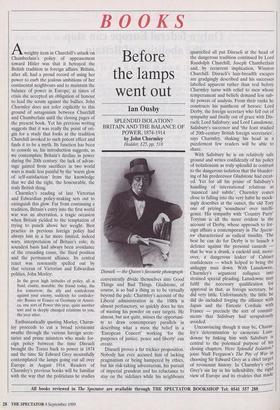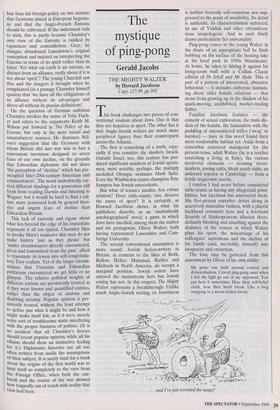BOOKS
Before the lamps went out
Ian Ousby
SPLENDID ISOLATION? BRITAIN AND THE BALANCE OF POWER, 1874-1914
by John Charmley Hodder, £25, pp. 518
Aweighty item in Churchill's attack on Chamberlain's policy of appeasement toward Hitler was that it betrayed the British tradition in foreign affairs. Britain, after all, had a proud record of using her power to curb the jealous ambitions of her continental neighbours and to maintain the balance of power in Europe; at times of crisis she accepted an obligation of honour to lead the scrum against the bullies. John Charmley does not refer explicitly to this ground of antagonism between Churchill and Chamberlain until the closing pages of the present book. Yet his previous writing suggests that it was really the point of ori- gin for a study that looks at the tradition Churchill invoked to such potent effect and finds it to be a myth. Its function has been to console us, his introduction suggests, as we contemplate Britain's decline in power during the 20th century: the lack of advan- tage gained from sacrifices in two world wars is made less painful by the 'warm glow of self-satisfaction' from the knowledge that we did the right, the honourable, the truly British thing.
Charmley's reading of late Victorian and Edwardian policy-making sets out to extinguish this glow. Far from continuing a tradition, Britain's entry into the first world war was an aberration, a tragic occasion when Britain yielded to the temptation of trying to punch above her weight. Best practice in previous foreign policy had always lain in a far more limited, indeed wary, interpretation of Britain's role; its soundest basis had always been avoidance of the crusading cause, the fixed position and the permanent alliance. Its central tenet was resonantly spelled out by that veteran of Victorian and Edwardian politics, John Morley: ln the great high latitudes of policy, all is fluid, elastic, mutable; the friend today, the foe tomorrow; the ally and confederate against your enemy, suddenly his confeder- ate: Russia or France or Germany or Ameri- ca, one sort of Power this year, quite another sort and in deeply changed relations to you, the year after.
Enthusiastically quoting Morley, Charm- ley proceeds to cut a broad revisionist swathe through the various foreign secre- taries and prime ministers who made for- eign policy between the time Disraeli brought the Tories back to power in 1874 and the time Sir Edward Grey mournfully contemplated the lamps going out all over Europe in August 1914. Readers of Charmley's previous books will be familiar with the way that the politicians he studies Disraeli — the Queen's favourite photograph conveniently divide themselves into Good Things and Bad Things. Gladstone, of course, is so bad a thing as to be virtually beyond the pale: Charmley's account of the Liberal administration in the 1880s is almost perfunctory, so quickly does he tire of wasting his powder on easy targets. He almost, but not quite, misses the opportuni- ty to draw contemporary parallels in describing what a mess the belief in a `European Concert' working 'for the purposes of justice, peace and liberty' can create.
Disraeli proves a far trickier proposition. Nobody has ever accused him of lacking pragmatism or being hampered by ethics, but his risk-taking adventurism, his pursuit of imperial grandeur and his reluctance to stay on the sidelines while his neighbours quarrelled all put Disraeli at the head of the dangerous tradition continued by Lord Randolph Churchill, Joseph Chamberlain and, by recurrent implication, Winston Churchill. Disraeli's hair-breadth escapes are grudgingly described and his successes labelled apparent rather than real before Charmley turns with relief to men whose temperament and beliefs demand less sub- tle powers of analysis. From their ranks he constructs his pantheon of heroes: Lord Derby, the foreign secretary who fell out of sympathy and finally out of grace with Dis- raeli; Lord Salisbury; and Lord Lansdowne, Salisbury's successor and 'the least studied of 20th-century British foreign secretaries', says Charmley, shaking his head in a puzzlement few readers will be able to share.
With Salisbury he is on relatively safe ground and writes confidently of his policy of isolationism as truly splendid in contrast to the dangerous isolation that the blunder- ing of his predecessor Gladstone had creat- ed. Yet for all his praise of Salisbury's handling of international relations as `nuanced and subtle', Charmley comes close to falling into the very habit he mock- ingly describes at the outset, the old Tory one of prizing 'soundness' over intelli- gence. His sympathy with 'Country Party' Toryism is all the more evident in the account of Derby, whose approach to for- eign affairs a contemporary in The Specta- tor characterised as radical timidity. The best he can do for Derby is to launch a defence against the personal canards that he was a drunk, a cuckold and, more- over, a dangerous leaker of Cabinet confidences — which helped to bring the unhappy man down. With Lansdowne, Charmley's argument collapses into strained special pleading. Lansdowne may fulfil the necessary qualification for approval in that, as foreign secretary, he did very little. Unfortunately, the little he did do included forging the alliance with Japan and the Entente Cordiale with France — precisely the sort of commit- ments that Salisbury had scrupulously avoided.
Unconvincing though it may be, Charm- ley's determination to exonerate Lans- downe by linking him with Salisbury is central to the polemical purpose of his closing chapters. Here Splendid Isolation? joins Niall Ferguson's The Pity of War in choosing Sir Edward Grey as a chief target of revisionist history. In Charmley's eyes Grey's sin lay in his inflexibility, the rigid view of Europe and its rivalries that made him base his foreign policy on two axioms: that Germany aimed at European hegemo- ny and that the Anglo-French Entente should be cultivated. If the indictment fails to stick, this is partly because Charmley's own view of the Entente is riddled by vagueness and contradiction. Grey, he charges, abandoned Lansdowne's original conception and insisted on interpreting the Entente in terms of its spirit rather than its letter. Yet what on earth is an entente, as distinct from an alliance, really about if it is not about 'spirit'? The young Churchill saw that and the dangers it brought when he complained (in a passage Charmley himself quotes) that 'we have all the obligations of an alliance without its advantages and above all without its precise definitions'.
On the question of German ambition Charm ley invokes the name of Fritz Fisch- er and refers to the arguments Keith M. Wilson put forward in The Policy of the Entente, but only in the most casual and unsatisfactory manner. He dismisses Wil- son's suggestion that the Germany with whom Britain slid into war was in fact a convenient invention designed to cover fears of our own decline, on the grounds that Edwardian diplomats did not share `the perception of "decline" which has pre- occupied later-20th-century historians and commentators'. The word undoubtedly car- ried different shadings for a generation still fresh from reading Darwin and listening to Wagner, but it would be hard to find a cul- ture more possessed both by general theo- ries and urgent fears of decline than Edwardian Britain.
This lack of curiosity and rigour about what lies beyond the edge of his immediate argument is all too typical. Charmley likes to invoke Marx's reminder that men do not make history 'just as they please' but under circumstances directly encountered, given and transmitted from the past', albeit to transmute its lesson into self-congratula- tory Tory realism. Yet of the larger circum- stances that Victorian and Edwardian politicians encountered we get little or no glimpse. The relative political weights of different nations are persistently treated as if they were known and quantified entities, rather than the object of anxious and doubting scrutiny. Popular opinion is per- sistently treated, without the least attempt to define just what it might be and how it might make itself felt, as if it were merely some sort of troublesome static interfering with the proper business of politics. (It is no accident that all Charmley's heroes should resent popular opinion, while all his villains should show an instinctive feeling for it.) Diplomatic histories are all too often written from inside the assumptions of their subject. It is surely fatal for a book about the origins of the first world war to limit itself so completely to the view from the Foreign Office, when both the out- break and the course of the war showed how tragically out of touch with reality that view had been.



























































 Previous page
Previous page